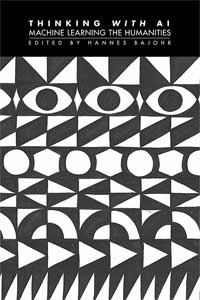Thinking with AI: new open access book
 Thursday, April 3, 2025 at 7:38AM
Thursday, April 3, 2025 at 7:38AM Thinking with AI, edited by Hannes Bajohr:
This edited volume explores a novel approach to the intersection of artificial intelligence and the humanities, proposing that instead of merely writing about AI, scholars should think with AI. Rather than treating AI as an external subject of study, the essays explore how concepts from artificial intelligence, machine learning, and data science can provide ways to rethink core humanistic questions of meaning, representation, and culture.
Critical AI Studies typically focuses on AI’s societal implications—its role in surveillance, exclusion, and global capitalism. This volume extends that critique, but also explores how AI brings our already existing understanding of aesthetics, language, history, and knowledge into relief and stands in an often productive conflict with them. AI’s pattern recognition and generative capabilities, for example, provokes new ways to grasp aesthetic unity, reimagine language as an autonomous system, and reconsider the boundaries between text and image.
The essays illustrate how AI can be used as a productive metaphor and intellectual tool for the humanities. From formalizing concepts like Stimmung and vibe to challenging traditional distinctions between writing and thought or between history and data, the book shows how AI can be not just an object of study but a conceptual catalyst that ignites unexpected connections to long-standing humanistic concerns. By engaging AI in this way, scholars can not only critique it but also expand the horizons of their own fields.
With essays by Peli Grietzer, Leif Weatherby, Mercedes Bunz, Hannes Bajohr, Fabian Offert, Lev Manovich, Babette Babich, Markus Krajewski, Orit Halpern, Christina Vagt and Audrey Borowski.
 Gary Hall | Comments Off |
Gary Hall | Comments Off | 






